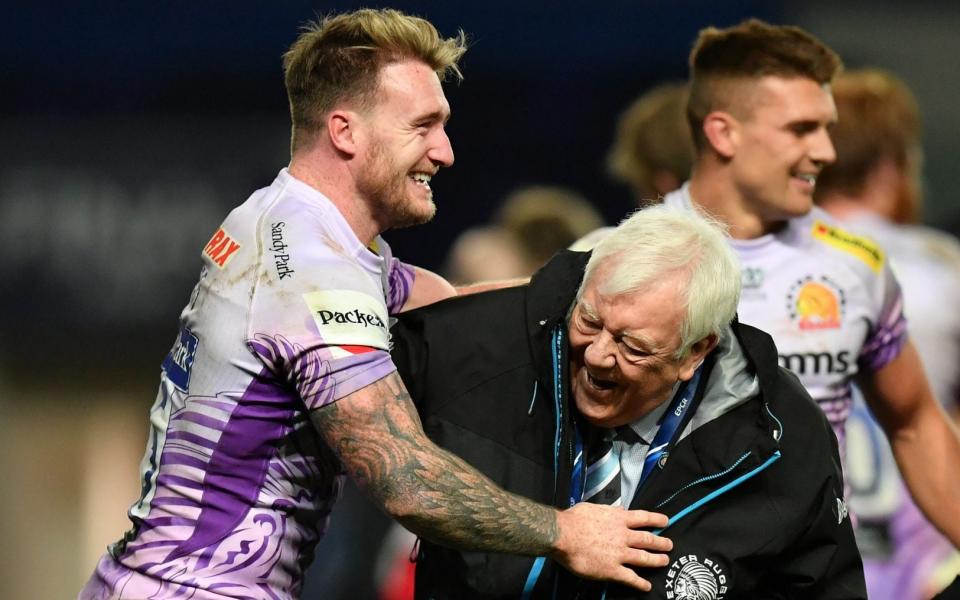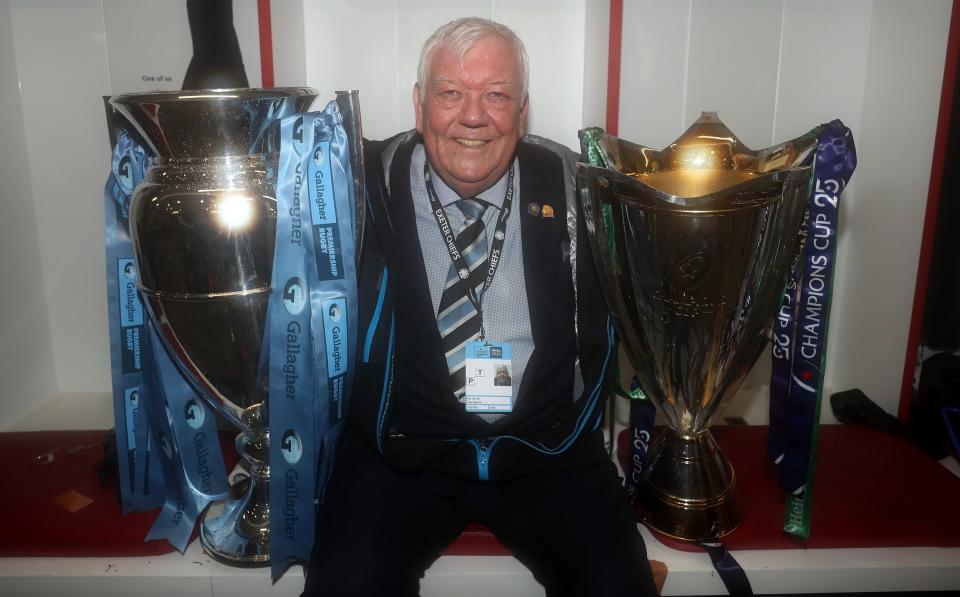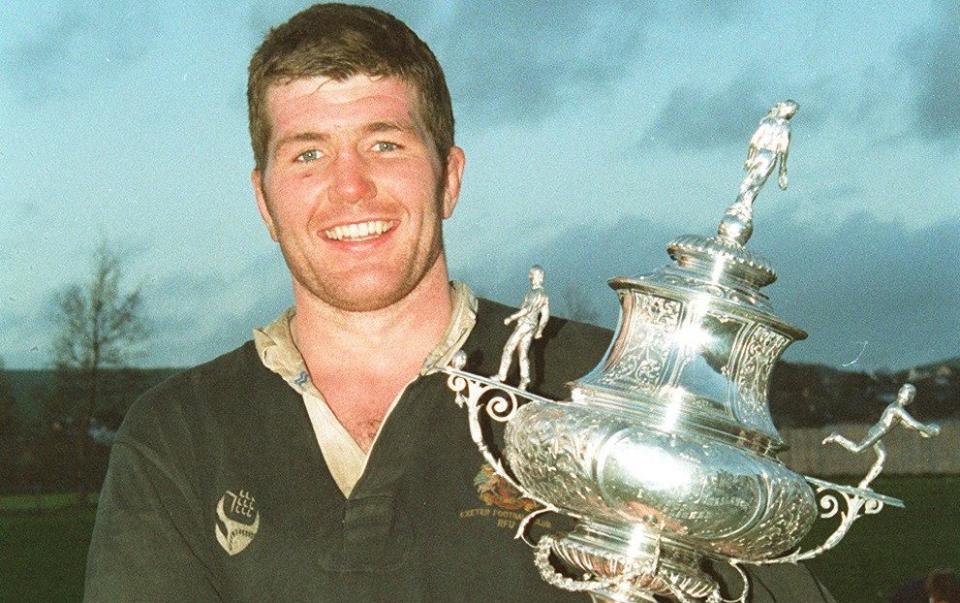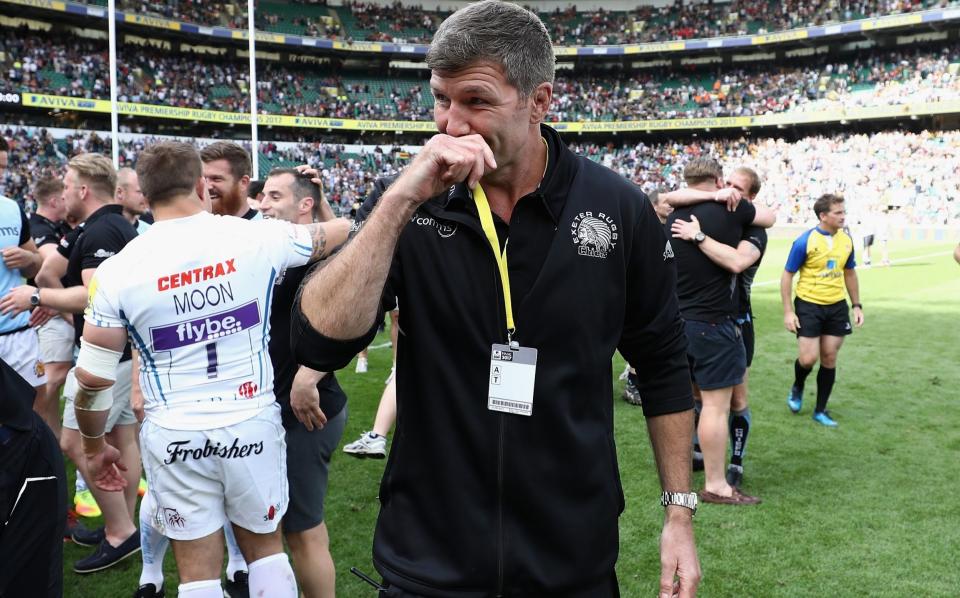Tony Rowe exclusive interview: Bugling at the 1966 World Cup final, his bond with Rob Baxter and why Exeter keep it local

It is a sunny, late July day in north-west London, 55 years ago, and a 16-year-old member of the Royal Marines Band called Tony Rowe just happens to have bagged himself a front-row seat for a piece of history.
As Geoff Hurst - no knighthood, then - burst through West Germany's tiring defence to apply the finish touch to England's first, and hitherto only, major tournament victory, Rowe was watching from the sidelines, preparing for his post-match performance on the bugle.
“I suppose you could say I was 'on the pitch' that day in 1966," Rowe recalls now, with a chuckle. "I was a young boy just out of training [he had left school at 15 to join the Marines Band], and was in the band that performed before and after the match and at half-time. I still have the rosettes and the programme somewhere. I remember the final few minutes and the tension and how the crowd went berserk - just fantastic.”
Maybe watching that moment gave Rowe a taste for an unlikely English sporting success story because, five decades later, it is he who stands as the driving force behind one of the most remarkable rugby tales of our age, the rise and rise of Exeter Chiefs, which has seen them conquer all at home and abroad.

It is hardly an unchronicled story, and yet the influence of Rowe's formative years remains relatively unexplored. But there is no doubting its significance on Rowe himself.
“It has been an important influence because I was 15 when I joined," he says. "It was like the ‘university of life’; you had to grow up very quickly. You had to have your wits about you and be pretty smart. Some of the discipline - making sure if you do something right, you do it right the first time, and how important teamwork is - all stayed with me. And now, when I put people together in the off-field team, I am very mindful of making sure of putting people around me who I can trust.”
Rowe's part in Exeter's ascent can hardly be overstated. Having been made redundant from the Royal Marines in 1973, he started a company selling and repairing powerboat engines - he was a successful powerboat racer in his own right - before moving into telecommunications. That was how his relationship with the Chiefs began, with his company, SW Comms, agreeing a £4,000 sponsorship deal with the club in 1993.
The club’s then chairman, John Baxter, father of current director of rugby Rob, was grateful for it - as Rowe remembers, Exeter had “literally no money” - but nobody could have realised where that initial foray would lead both Rowe, now Chiefs chairman and chief executive, and his club.
One man Rowe has been able to trust since his earliest involvement with the club is Baxter, who was a second row for Chiefs when Rowe arrived in 1993.
“Rob was the enforcer," Rowe laughs. "Back before TV cameras and everything, the game was slightly different in that you used to settle your scores on the pitch. Rob was the man in the squad that the opposition knew they couldn’t get away with taking advantage of because Rob was going to put them in their place, much to the annoyance of many refs who would say, ‘I know bloody Baxter did that but I didn’t see him!’”

The relationship today is as strong as ever, and with good reason: Baxter has delivered two Premiership titles and, last year, the Champions Cup. He is perennially touted as a successor to Eddie Jones with England, and yet few doubt Baxter's firm denials of interest: he seems absolutely content to remain in his corner of rugby heaven in the south west.
Rowe, for one, could not be happier with that. “Although Rob and I don’t socialise, it is a bit more of a relationship than chairman and director of rugby. It has been a long journey together, we both share the same ambitions, we share the pain and the glory together, and it is very helpful.”

Rowe stepped down from SW Comms earlier this year at the age of 72, but there is no sign of him slowing down when it comes to the Chiefs. There is plenty to occupy his thoughts on and off the field, from Exeter’s impending Premiership play-off semi-finals to the thorny issue of the league being ring-fenced from relegation.
Exeter have a slightly different ownership model to some of their rivals in that it is member-owned, but Rowe very much steers the ship. The club's rise from the amateur ranks to the top of the game also explains why he has much to say on the topic of ring-fencing: there is a moratorium on relegation for this season, with the winner of the Championship - either Ealing Trailfinders or Saracens - joining an expanded 13-team Premiership next year.
Rowe's view is that ambitious Championship sides should get a chance to enter a further expanded Premiership. “The view of Exeter is let’s expand it up to 14 teams, if you have a Championship club that has the ambition, the facilities, the money and the supporter base – then happy days.
“But there has to be a mechanism in the Premiership that will not allow an owner or a club to be totally underfunded and become underfunded. We have a lot of work to do.”
Returning to his own experiences he says: “I could name you half-a-dozen Championship clubs that were there when we were in it and harboured ambitions to get in the Premiership but haven’t done anything about it. You can’t sit back with an ambition and expect it to happen, you have to work at it and do everything you can to achieve it. But unfortunately that means clubs having to find a lot of investment. It was a massive step for us in 2010 and where the Premiership is today, we wouldn’t have been able to make that step 10 years ago. We only just about managed it."
Key to that was transforming the infrastructure of the club. Prior to 2006, Exeter played at the homely County Ground - a 5,000-capacity home which once played host to the first ever All Blacks touring team, but which was an effective block on ambition. Rowe helped convince a sceptical public that Exeter needed to move to a purpose-built stadium on the edge of the city, just by the M5 motorway: now, Sandy Park can accommodate almost 13,000 fans and is rightly proud of its fearsome reputation.

“We planned it - it wasn’t like it just arrived," Rowe continues. "That is why we built Sandy Park; we had been planning for a number of years. Financially, we knew we could survive. You have to have stamina as well as the finances. As a sponsor, I was putting in money, year after year, you can’t end up with donor fatigue.”
Exeter's ambition may extend across the continent, but the talent that has got them there is still largely local. Many of the squad are sourced from the south west, something Rowe makes no apology for. "We don’t go out into the marketplace looking to sign foreigners as the first choice; we would rather look within our academy structure and our home-grown boys to fulfil the positions. It is only if we are going to be short in a certain position that we will go out and have a look.
“If we are short on positions, then that might change - so Stuart Hogg is a good example. We hadn’t had a proper full-back for a number of years, so if there wasn't a full-back of good enough quality coming through our academy, Rob was happy to go out into the marketplace and buy one in.”
Rowe takes such pride in the academy structure, which has produced Lions Sam Simmonds and Luke Cowan-Dickie, that once a player makes the transition to the senior team, he makes sure to invite the parents to watch a game with him at Sandy Park. It builds a bond with the player, and explains why he takes such personal delight in players’ successes.
“I am absolutely over the moon for our boys. I have met most of the parents and that is very important to me. I know how chuffed Sam Simmonds’ parents are. I know Luke Cowan-Dickie’s father well - he is a fisherman as he works for a friend of mine. I love that part of it. I love how our West Country boys are coming through to the Lions and England. I am so proud of that.”

 Yahoo Sport
Yahoo Sport 





































